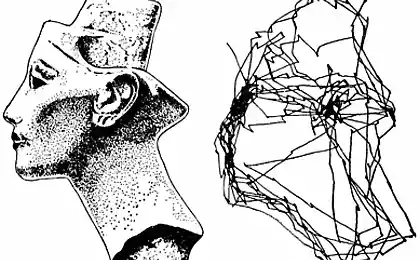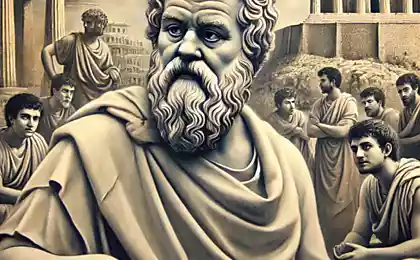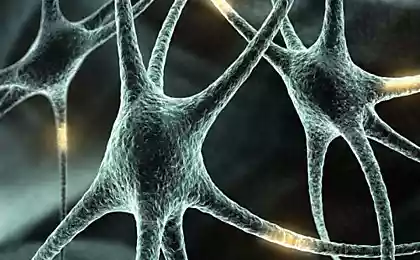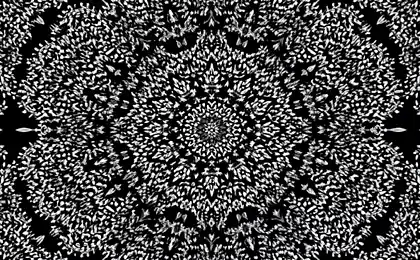834
10 basic philosophical concepts that you need to know
The site publishes a very interesting collection in which brief and accessible language explains the most important concepts of philosophy, which is useful to know each cheloveku.Teoriya ideas PlatonaPlaton was the first to separate the "world of things" from "the world of ideas." The idea (eidos), according to Plato - is the source of things, its prototype of the underlying specific subject. are present in our minds, for example, "the idea of the table" can either coincide with a particular table in reality or not match, but "the idea of the table" and "concrete table" still continue to exist in the minds of separately.
A clear illustration of the division of the world into the world of ideas and the world of subject is the famous Platonic myth of the cave in which people see things and not others, but only their shadows on the cave wall. Cave for Plato is an allegory of the world, where people live, believing that the shadows on the cave walls - the only way of knowing reality. However, in reality the shadows - just an illusion, but an illusion, because of which the person does not able to refuse because of their inability to put the critical question of the existence of reality and overcome its "false consciousness».
Developing the Platonic ideas, philosophers of later times came to the concept of the transcendent and the "thing-in-itself».
IntrospektsiyaIntrospektsiya (from the Latin. Introspecto - look inside) - a way of self-discovery, in which a person is watching their internal response to the events of the outside world. Introspection - is a fundamental human need, allowing him to scrutinize himself, to explain himself why he believes what he believes, and if there is the possibility that his belief is wrong.
The founder of the method is considered to be a British educator and philosopher John Locke, who, relying on the ideas of Descartes, pointed out that there are only two direct source of all knowledge: the objects of the external world and the mind of man. In this connection, all the relevant facts of the psychological mind open to learning only to knowledge of a subject - it may well be that the "blue" for one person - is not the same thing as "blue" for the other.
Method introspection helps to track the stage of thinking, dissecting feelings on the elements and providing a complete picture of the relationship of thought and action. Introspection teaches to think abstractly and wider, for example to take "a large red apple," as "a feeling of red alternating with the impression round, which occurs simultaneously with the light tickling language, apparently, the track mouthfeel ". But do not get too deep into introspection - excessive focus on monitoring their own experience dulls the perception of reality.
SolipsizmSolipsizm (from the Latin. Solus - «only» and ipse - «himself") - a philosophical concept by which a person recognizes as the only existing and are always available for its intervention a reality only own mind. «There is no God, no universe, no life, no humanity, no heaven, no hell. All this is just a dream, intricate foolish dream. There is nothing except you. And you just thought, wandering thoughts, aimless thought, a homeless thought, lost in the eternal space » - formulates the main message of solipsism Mark Twain in his story" The Mysterious Stranger. " The same idea, in general, illustrate the film "Mr. Nobody", "Home" and "The Matrix».
The rationale of solipsism - the fact that a person is only available to his perception of reality and thought, whereas the external world is beyond credibility. The existence of things for a person will always be a matter of faith, not more, as if someone requires proof of their existence, the person can not provide them. In other words, no one can be sure of the existence of something outside of his mind.
TeoditseyaEsli world was created by some higher plan, why there are so many absurd and suffering? Most believers will sooner or later begin to ask this question. It comes to the aid of desperate theodicy - religious-philosophical concept that God is unconditionally recognized the absolute good, which is removed from any responsibility for the presence of evil in the world.
This doctrine was established by Leibniz to conditionally "justify" God. The main question of the concept: "Why did not God wants to rid the world of misery?" Response options were reduced to four: Either God wants to rid the world of evil, but can not, or can, but do not want or can not and does not want to, either, and maybe he wants. The first three options do not correspond with the idea of God as the Absolute, as the last option does not explain the existence of evil in the world.
Moral relyativizmZhizn would be much easier if good and evil were fixed, absolutes - but often we are faced with the fact that what is good in one situation may be evil to another. Becoming less categorical about what is good and what is bad, we are approaching the moral relativism - ethical principle, denies the separation of the concepts "good" and "evil" and does not recognize the existence of mandatory moral norms and categories
To interpret this idea can be different - from "nothing is sacred" to "not blindly to drive life in the narrow confines." In any case, the spectrum of issues that puts moral relativism - a useful exercise for the mind and a good test of all persuasions.
Definitive imperativZolotoe ethics rule - "Do unto others as you would like them do unto you" - sounds even more significant if the reference to Immanuel Kant: the provision is included in his concept of the categorical imperative. For the ethical concept, a person must act according to that maxim, which, in his opinion, could become a universal law. It is also within this concept Kant proposes not to consider the other person as a means, and to treat it as the ultimate goal.
Of course this approach does not deliver us from error, but the solutions are much more consciously, if you think that every time you choose not only for himself, but for all humanity.
DeterminizmRazmyshlyaya of free will, fate and predestination, we are entering the field of determinism (lat. Determinare - define, limit) - philosophical doctrine of predestination, the interconnectedness of what is happening and about the presence of all existing single cause. «Everything is predetermined. Everything will take place in a predetermined pattern "- this is the main postulate of determinism. Free Will, according to this doctrine, there is no, and in different interpretations of determinism man's fate depends on various factors: either it is pre-determined by God or extensive philosophically conceptualized category "nature».
Within the framework of the doctrine of determinism no event shall not be considered random, and are a consequence of advance foregone conclusion, but an unknown person chain of events. determinism precludes belief in free will, in which the responsibility for the actions rests with the man himself and makes a person entirely entrust their fate causality, laws, and the omnipotence of the outside world. Comfortable, in general, the concept - for those who do not want to take responsibility for their own lives.
Cogito ergo sum «I think, therefore I am" - a philosophical concept rationalist René Descartes and good support for the doubters around. This formula appeared when trying to find a primary, unquestionable and absolute truth on the basis of which it is possible build a philosophy of absolute knowledge.
Descartes questioned everything: the outside world, his feelings, God's opinion. The only thing that could not be put into question, - is its own existence, as the process of doubt in their own existence, are proof of this existence. Hence there was a formula: "I doubt it, then thought; I think, therefore I exist "is transformed into" I think, therefore I am "- this phrase has become a metaphysical basis for modern philosophy. It proclaimed dominant position of the subject, around which it became possible to build a reliable knowledge.
The death of God in Nietzsche's "God is dead! God will not be resurrected! And we have killed him! How to comfort us, the killer of killers! The most sacred and powerful beings, which has only been in the world, bled to death under our knives - who will wash away the blood from us? ". The thesis of "God is dead" Nietzsche proclaimed, implying not the death of God in the literal sense - he meant that in a traditional society, the existence of God was the fact he was in a single reality with the people, but in the modern era it has ceased to be a part of the outer reality, becoming more internal idea. This caused a crisis of values, which previously was based on a Christian worldview. So, the time has come to review the system - in fact, and this has been the philosophy and culture of postmodernism.
KrizisEkzistentsialny existential crisis was a consequence of the collapse of the above-described conventional system of values - it is generated by the thought that the human existence has no predetermined destiny, no objective meaning
via www.tayni-mirozdaniya.ru/2015/05/10_44.html
A clear illustration of the division of the world into the world of ideas and the world of subject is the famous Platonic myth of the cave in which people see things and not others, but only their shadows on the cave wall. Cave for Plato is an allegory of the world, where people live, believing that the shadows on the cave walls - the only way of knowing reality. However, in reality the shadows - just an illusion, but an illusion, because of which the person does not able to refuse because of their inability to put the critical question of the existence of reality and overcome its "false consciousness».
Developing the Platonic ideas, philosophers of later times came to the concept of the transcendent and the "thing-in-itself».
IntrospektsiyaIntrospektsiya (from the Latin. Introspecto - look inside) - a way of self-discovery, in which a person is watching their internal response to the events of the outside world. Introspection - is a fundamental human need, allowing him to scrutinize himself, to explain himself why he believes what he believes, and if there is the possibility that his belief is wrong.
The founder of the method is considered to be a British educator and philosopher John Locke, who, relying on the ideas of Descartes, pointed out that there are only two direct source of all knowledge: the objects of the external world and the mind of man. In this connection, all the relevant facts of the psychological mind open to learning only to knowledge of a subject - it may well be that the "blue" for one person - is not the same thing as "blue" for the other.
Method introspection helps to track the stage of thinking, dissecting feelings on the elements and providing a complete picture of the relationship of thought and action. Introspection teaches to think abstractly and wider, for example to take "a large red apple," as "a feeling of red alternating with the impression round, which occurs simultaneously with the light tickling language, apparently, the track mouthfeel ". But do not get too deep into introspection - excessive focus on monitoring their own experience dulls the perception of reality.
SolipsizmSolipsizm (from the Latin. Solus - «only» and ipse - «himself") - a philosophical concept by which a person recognizes as the only existing and are always available for its intervention a reality only own mind. «There is no God, no universe, no life, no humanity, no heaven, no hell. All this is just a dream, intricate foolish dream. There is nothing except you. And you just thought, wandering thoughts, aimless thought, a homeless thought, lost in the eternal space » - formulates the main message of solipsism Mark Twain in his story" The Mysterious Stranger. " The same idea, in general, illustrate the film "Mr. Nobody", "Home" and "The Matrix».
The rationale of solipsism - the fact that a person is only available to his perception of reality and thought, whereas the external world is beyond credibility. The existence of things for a person will always be a matter of faith, not more, as if someone requires proof of their existence, the person can not provide them. In other words, no one can be sure of the existence of something outside of his mind.
TeoditseyaEsli world was created by some higher plan, why there are so many absurd and suffering? Most believers will sooner or later begin to ask this question. It comes to the aid of desperate theodicy - religious-philosophical concept that God is unconditionally recognized the absolute good, which is removed from any responsibility for the presence of evil in the world.
This doctrine was established by Leibniz to conditionally "justify" God. The main question of the concept: "Why did not God wants to rid the world of misery?" Response options were reduced to four: Either God wants to rid the world of evil, but can not, or can, but do not want or can not and does not want to, either, and maybe he wants. The first three options do not correspond with the idea of God as the Absolute, as the last option does not explain the existence of evil in the world.
Moral relyativizmZhizn would be much easier if good and evil were fixed, absolutes - but often we are faced with the fact that what is good in one situation may be evil to another. Becoming less categorical about what is good and what is bad, we are approaching the moral relativism - ethical principle, denies the separation of the concepts "good" and "evil" and does not recognize the existence of mandatory moral norms and categories
To interpret this idea can be different - from "nothing is sacred" to "not blindly to drive life in the narrow confines." In any case, the spectrum of issues that puts moral relativism - a useful exercise for the mind and a good test of all persuasions.
Definitive imperativZolotoe ethics rule - "Do unto others as you would like them do unto you" - sounds even more significant if the reference to Immanuel Kant: the provision is included in his concept of the categorical imperative. For the ethical concept, a person must act according to that maxim, which, in his opinion, could become a universal law. It is also within this concept Kant proposes not to consider the other person as a means, and to treat it as the ultimate goal.
Of course this approach does not deliver us from error, but the solutions are much more consciously, if you think that every time you choose not only for himself, but for all humanity.
DeterminizmRazmyshlyaya of free will, fate and predestination, we are entering the field of determinism (lat. Determinare - define, limit) - philosophical doctrine of predestination, the interconnectedness of what is happening and about the presence of all existing single cause. «Everything is predetermined. Everything will take place in a predetermined pattern "- this is the main postulate of determinism. Free Will, according to this doctrine, there is no, and in different interpretations of determinism man's fate depends on various factors: either it is pre-determined by God or extensive philosophically conceptualized category "nature».
Within the framework of the doctrine of determinism no event shall not be considered random, and are a consequence of advance foregone conclusion, but an unknown person chain of events. determinism precludes belief in free will, in which the responsibility for the actions rests with the man himself and makes a person entirely entrust their fate causality, laws, and the omnipotence of the outside world. Comfortable, in general, the concept - for those who do not want to take responsibility for their own lives.
Cogito ergo sum «I think, therefore I am" - a philosophical concept rationalist René Descartes and good support for the doubters around. This formula appeared when trying to find a primary, unquestionable and absolute truth on the basis of which it is possible build a philosophy of absolute knowledge.
Descartes questioned everything: the outside world, his feelings, God's opinion. The only thing that could not be put into question, - is its own existence, as the process of doubt in their own existence, are proof of this existence. Hence there was a formula: "I doubt it, then thought; I think, therefore I exist "is transformed into" I think, therefore I am "- this phrase has become a metaphysical basis for modern philosophy. It proclaimed dominant position of the subject, around which it became possible to build a reliable knowledge.
The death of God in Nietzsche's "God is dead! God will not be resurrected! And we have killed him! How to comfort us, the killer of killers! The most sacred and powerful beings, which has only been in the world, bled to death under our knives - who will wash away the blood from us? ". The thesis of "God is dead" Nietzsche proclaimed, implying not the death of God in the literal sense - he meant that in a traditional society, the existence of God was the fact he was in a single reality with the people, but in the modern era it has ceased to be a part of the outer reality, becoming more internal idea. This caused a crisis of values, which previously was based on a Christian worldview. So, the time has come to review the system - in fact, and this has been the philosophy and culture of postmodernism.
KrizisEkzistentsialny existential crisis was a consequence of the collapse of the above-described conventional system of values - it is generated by the thought that the human existence has no predetermined destiny, no objective meaning
via www.tayni-mirozdaniya.ru/2015/05/10_44.html























